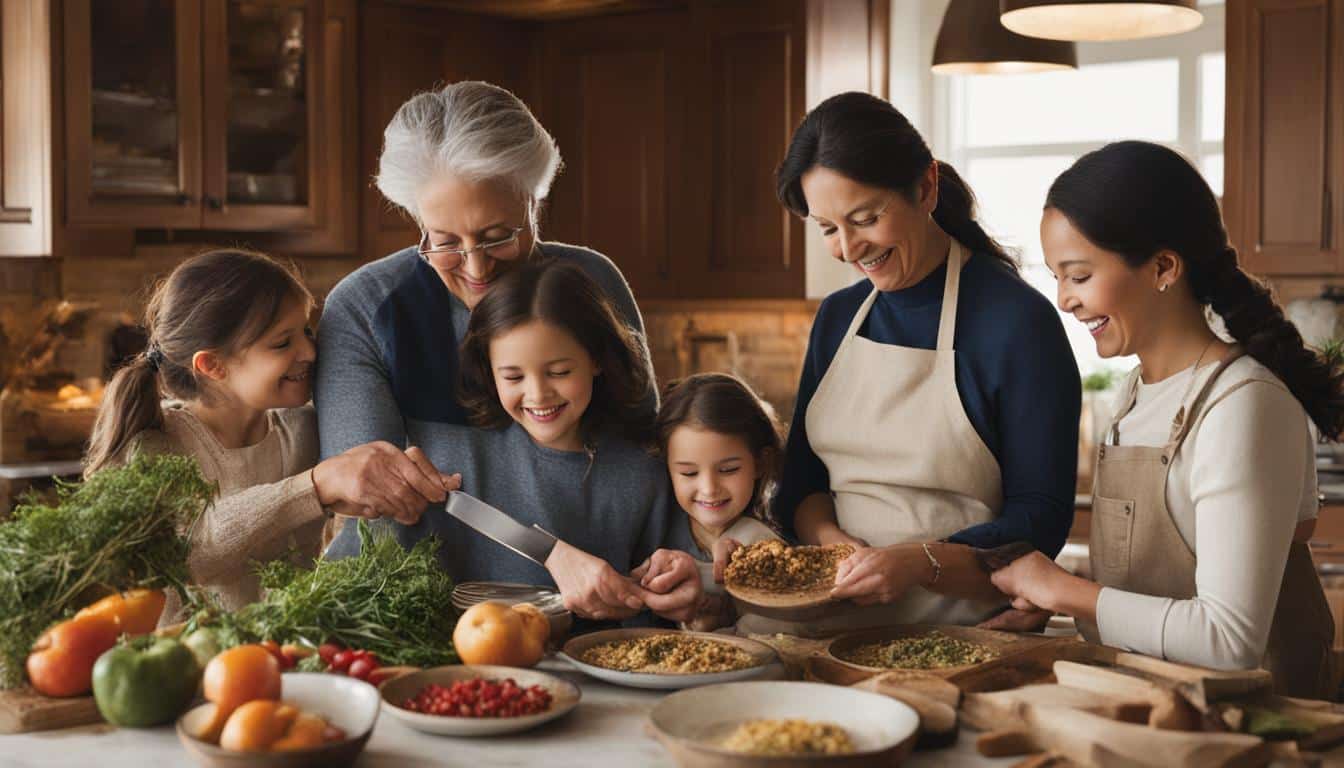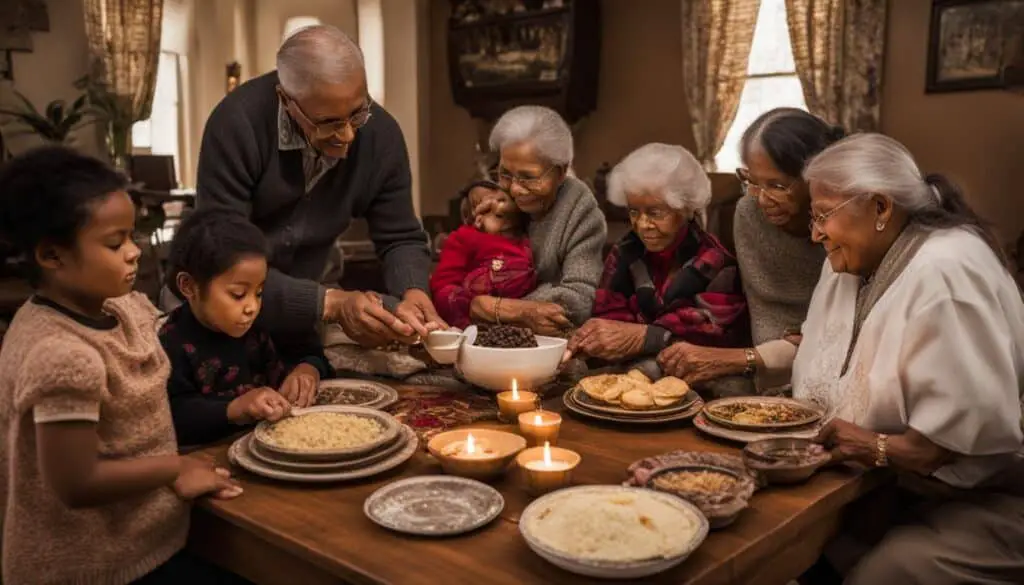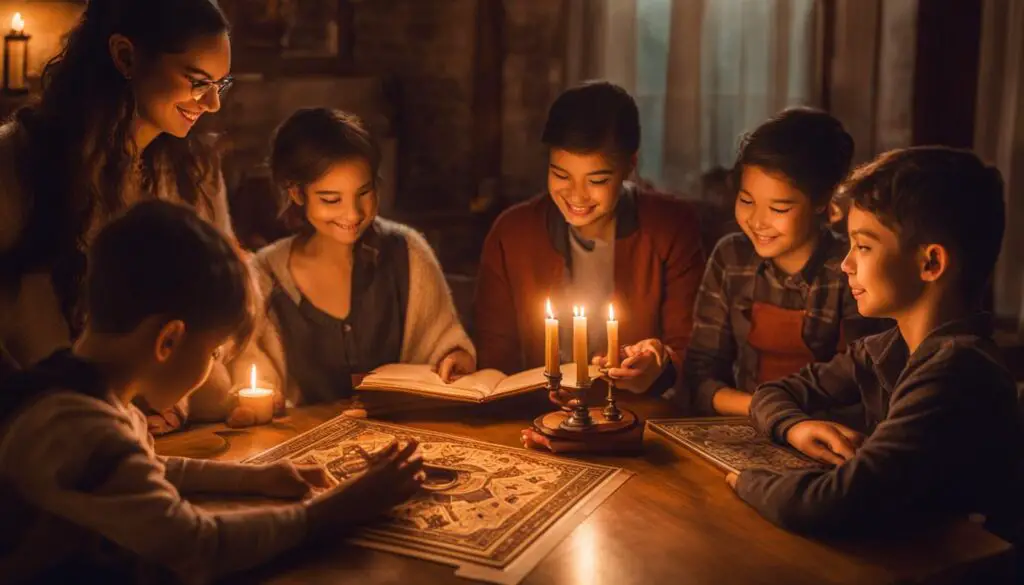
Establishing Meaningful Family Traditions and Values
Welcome to the first section of our article on establishing family traditions and values. In today’s fast-paced world, it is more important than ever to prioritize the connections and values that bind our families together. Family traditions play a crucial role in building strong family values and creating lasting memories. They provide a sense of purpose, belonging, and identity, and help instill values in the family for generations to come.
Family traditions are not just activities or routines; they are the heart and soul of a family. Whether it’s a weekly game night, an annual vacation, or a cherished holiday celebration, these traditions create a sense of stability, joy, and togetherness. They give us something to look forward to and provide a framework for creating lifelong memories.
By passing down family traditions, we ensure that our values and beliefs are preserved and handed down to future generations. These traditions serve as a reminder of who we are as a family and what we hold dear. They help shape our children’s characters, teach them important life lessons, and provide a sense of continuity and connection to their roots.
Creating meaningful family traditions starts with identifying what is important to your family. Consider your family’s interests, values, and cultural background. Involve everyone in the decision-making process and choose activities that resonate with each family member. Whether it’s a shared hobby, a cultural celebration, or a simple weekly ritual, make sure the tradition reflects your family’s unique identity.
Remember, family traditions don’t have to be grand or complicated. It’s the consistency and intention behind them that truly matter. Start small, be flexible, and adapt the traditions as your family grows and changes. The most important thing is to make sure everyone feels included and valued in the process.
In the following sections of this article, we will explore what family traditions are, why they are important, and provide examples of different traditions you can incorporate into your family life. Stay tuned!
Key Takeaways:
- Family traditions are essential for building strong family values and creating lasting memories.
- Traditions provide a sense of purpose, belonging, and identity within the family.
- Passing down family traditions helps preserve values and beliefs for future generations.
- Creating meaningful traditions starts with identifying what is important to your family.
- Start small, be flexible, and adapt traditions as your family grows and changes.
What are Family Traditions?
Family traditions are activities or patterns of behavior that reflect a family’s values, interests, or beliefs. They represent the unique family unit and can be passed down through the generations. Family traditions can exist in various types of families, including traditional nuclear families, blended families, extended families, and chosen families. These traditions can be symbolic and have deep significance or be secular events that promote family connection and quality time together.
Family traditions play an essential role in shaping a family’s culture and identity. They create a sense of belonging and provide a framework for family members to bond and develop lasting memories. Whether it’s gathering around the dinner table every Sunday, celebrating cultural holidays, or embarking on an annual vacation, family traditions create a sense of stability and reinforce a family’s core values.
In traditional nuclear families, which consist of a married couple and their children, family traditions often revolve around major life events, such as religious ceremonies, birthdays, and anniversaries. These traditions can help strengthen the bond between family members and reinforce their shared values and beliefs.
Blended families face the unique challenge of merging two separate family units into a cohesive whole. Family traditions in blended families can help facilitate this integration process by creating a sense of unity and shared experiences. These traditions may include creating new family rituals, such as a regular game night or a special family outing, to bring everyone together.
Extended families, which include grandparents, aunts, uncles, and cousins, often have rich and diverse traditions that span generations. These traditions can strengthen family connections and preserve cultural heritage. Examples of extended family traditions include annual family reunions, holiday celebrations, and storytelling sessions that pass down family history and values.
Chosen families, comprising close friends or individuals who may not be related by blood, also develop their own unique traditions. These traditions are built upon a foundation of love, support, and shared experiences. Chosen families may create traditions such as monthly gatherings or annual trips to foster a sense of belonging and create meaningful bonds.
Family traditions are not limited to specific types of families but are a part of every family’s story. They promote family cohesion, provide a sense of identity, and contribute to the overall well-being of family members.
Family traditions can range from simple to elaborate, and from time-honored to newly established. They can be rooted in cultural or religious practices or can be entirely unique to a particular family. Regardless of their form, family traditions symbolize shared values, create a sense of belonging, and provide opportunities for family members to connect on a deeper level.
Why are Family Traditions Important?
Family traditions hold immense significance as they contribute to the overall well-being of a family and help foster a strong sense of unity and connection. These traditions establish a sense of comfort and security within the family, providing a stable foundation for family members to rely on and find solace in. They act as a source of familiarity and consistency in an ever-changing world, offering a sense of stability that helps family members navigate through life’s challenges.
Family traditions also serve as a compelling reason for the family to come together, ensuring that quality time is spent in each other’s company. Whether it’s celebrating holidays, birthdays, or special occasions, family traditions create opportunities for shared experiences and bonding. By engaging in these traditions, family members strengthen their relationships, deepen their understanding of one another, and build lasting memories that will be cherished for generations.
Furthermore, family traditions promote a healthy work-life balance by emphasizing the importance of dedicating time and energy to one’s family. They provide a respite from the demands of daily life and remind family members to prioritize their relationships and well-being. Whether it’s a weekly game night, a monthly family outing, or a yearly vacation, these traditions carve out dedicated time for family members to relax, recharge, and enjoy each other’s company.
Creating and maintaining family traditions is crucial for nurturing good family dynamics. They establish a sense of identity and belonging within the family, reinforcing the notion that each member is an integral part of the whole. Family traditions promote teamwork, cooperation, and communication, fostering a positive and supportive family environment. They instill values such as respect, compassion, and empathy, shaping individuals into well-rounded and compassionate human beings.
Moreover, family traditions play a vital role in keeping cultural and religious traditions alive. They serve as a means of passing down customs, beliefs, and rituals from one generation to another, ensuring that cultural heritage is preserved. Family members gain a deeper understanding and appreciation for their cultural or religious identity through participating in these traditions, fostering a sense of pride and connection to their heritage.
In conclusion, family traditions are not merely routine activities but essential elements that contribute to the overall well-being of a family. They create a sense of comfort, provide a reason for family members to come together, promote a healthy work-life balance, foster good family dynamics, and preserve cultural and religious traditions. By embracing and nurturing family traditions, we can cultivate an environment that nurtures strong relationships, enriches our lives, and creates a lasting legacy of love and togetherness.

20 Family Tradition Examples
Establishing family traditions is a wonderful way to create lasting memories and strengthen the bond within your family. Here are 20 family tradition examples that you can consider:
- Swim on the first day of spring: Welcome the arrival of warmer weather by taking a family swim on the first day of spring.
- Make homemade gifts for Christmas: Create a tradition of crafting personalized, heartfelt gifts for each other during the holiday season.
- Go hiking in the same place or at the same time: Choose a favorite hiking trail or set a regular time to explore nature as a family.
- Have a movie night: Pick a night each week to gather as a family and watch a favorite movie or discover new ones together.
- Visit the same restaurant: Make it a tradition to dine at a particular restaurant on special occasions or as a regular family outing.
- Do a family digital detox: Set aside a designated period of time, like a weekend, to disconnect from screens and focus on quality time together.
- Take up a new activity as a family: Explore a new hobby or sport together, such as cooking, painting, or playing a musical instrument.
- Start a gratitude jar: Create a jar where each family member can write down things they’re grateful for and share them during special moments.
- Do something for the community: Volunteer together as a family to give back to your community and instill the value of helping others.
- Go camping: Plan regular camping trips to enjoy nature, bond as a family, and disconnect from the hustle and bustle of daily life.
- Celebrate the full moon: Acknowledge the beauty of the lunar cycle by hosting a special dinner or gathering during the full moon.
- Have a ritualistic fire ceremony: Build a bonfire and gather around it to share stories, roast marshmallows, and enjoy the warmth of the flames.
- Cook family recipes: Pass down cherished family recipes from generation to generation by cooking them together as a family.
- Make a family scrapbook: Create a scrapbook filled with photos, mementos, and written memories to document your family’s journey.
- Game night: Set aside a regular evening for friendly competition and bonding over board games or card games.
- Show and tell celebrations: Allow each family member to take turns sharing something special to them, whether it’s a talent, an accomplishment, or a cherished possession.
These are just a few examples to inspire you in establishing your own family traditions. Remember, the most important thing is to spend quality time together, create meaningful experiences, and forge lasting bonds.
Creating Your Own Family Traditions
To create your own family traditions, it is essential to consider your family’s interests and values. By aligning your traditions with what matters most to your family, you can create meaningful experiences that foster a sense of connection and togetherness.
Start the process by brainstorming ideas together as a family. Encourage everyone to contribute their suggestions, ensuring that each family member feels valued and included in the decision-making process. This not only strengthens family bonds but also brings a sense of ownership and excitement to the traditions you establish.
It’s important to start small when introducing new traditions. This allows your family to adapt and adjust comfortably, ensuring that the traditions are sustainable in the long run. Starting with simple rituals or activities also provides an opportunity to build a solid foundation upon which more elaborate traditions can be developed.
Flexibility is key when creating family traditions. As your family changes and grows, the traditions may need to evolve as well. Be open to making adjustments and modifications along the way to accommodate new interests, schedules, or circumstances. The ability to adapt will ensure that your traditions remain meaningful and enjoyable for everyone.
Most importantly, have fun while creating and celebrating your family traditions. Let go of perfectionism and embrace the joy and spontaneity that comes with spending time together. Remember that the purpose of these traditions is to create lasting memories and strengthen the bond between family members.
So embark on this journey of creating your own family traditions, guided by your family’s unique interests and values. Involve everyone, start small, be flexible, and most importantly, enjoy the process. These traditions will become cherished moments that your family will treasure for years to come.

Benefits of Creating Family Traditions
“Family traditions provide a consistent framework for families to connect, bond, and create lasting memories together.”
The creation of family traditions offers numerous benefits for both parents and children. Let’s explore some of these benefits:
- Strengthening Family Bonds: Family traditions provide a consistent framework for families to connect, bond, and create lasting memories together.
- Instilling Values: Through traditions, families can reinforce and pass down important values, such as kindness, gratitude, and generosity.
- Promoting a Sense of Belonging: Engaging in traditions fosters a strong sense of belonging within the family unit, providing a source of comfort and security for all members.
- Enhancing Communication: Traditions create opportunities for open and meaningful communication, allowing family members to share their thoughts, feelings, and experiences.
- Promoting Emotional Well-being: Regular participation in family traditions has been shown to contribute to an individual’s emotional well-being, reducing stress and promoting a sense of happiness and fulfillment.
Conclusion
Preserving family traditions is crucial for strengthening family bonds, passing down values, and creating lasting memories. These traditions provide a sense of belonging and unity within the family, fostering a deep connection between family members. By engaging in meaningful activities and rituals, we can instill important life lessons and values in our loved ones.
Family traditions serve as a reminder of our shared history and heritage, helping to keep our cultural and personal identities alive. They also offer a space for quality time, away from the distractions of everyday life, allowing family members to truly connect with one another. These moments create lasting memories that will be cherished for generations to come.
Investing in family traditions is an investment in the well-being of our loved ones. It is through these traditions that we pass down our values, strengthen our bonds, and create a sense of continuity and stability. So let us make a commitment to establish and uphold meaningful family traditions, ensuring the preservation of our family’s legacy and the nourishment of our relationships.
FAQ
What are some examples of family traditions?
Some examples of family traditions include swimming on the first day of spring, making homemade gifts for Christmas, going hiking in the same place or at the same time, having a movie night, visiting the same restaurant, doing a family digital detox, taking up a new activity as a family, starting a gratitude jar, doing something for the community, going camping, celebrating the full moon, having a ritualistic fire ceremony, cooking family recipes, making a family scrapbook, having game nights, and having show and tell celebrations.
How do I create my own family traditions?
To create your own family traditions, consider your family’s interests and values. Brainstorm ideas together and involve the entire family in the process. Start with small traditions and gradually build from there. Be flexible and open to making changes or adjustments as your family grows and changes. Above all, remember to have fun and enjoy spending time together as a family while creating meaningful traditions that reflect your family’s unique identity.
Why are family traditions important?
Family traditions are important as they create a sense of comfort and security, provide a reason for the family to get together, promote a healthy work-life balance, create good family dynamics, give family members a sense of belonging, and keep cultural or religious traditions alive. They nurture relationships between family members, contribute to social and emotional well-being, and help individuals maintain a connection to their cultural heritage or religious beliefs.